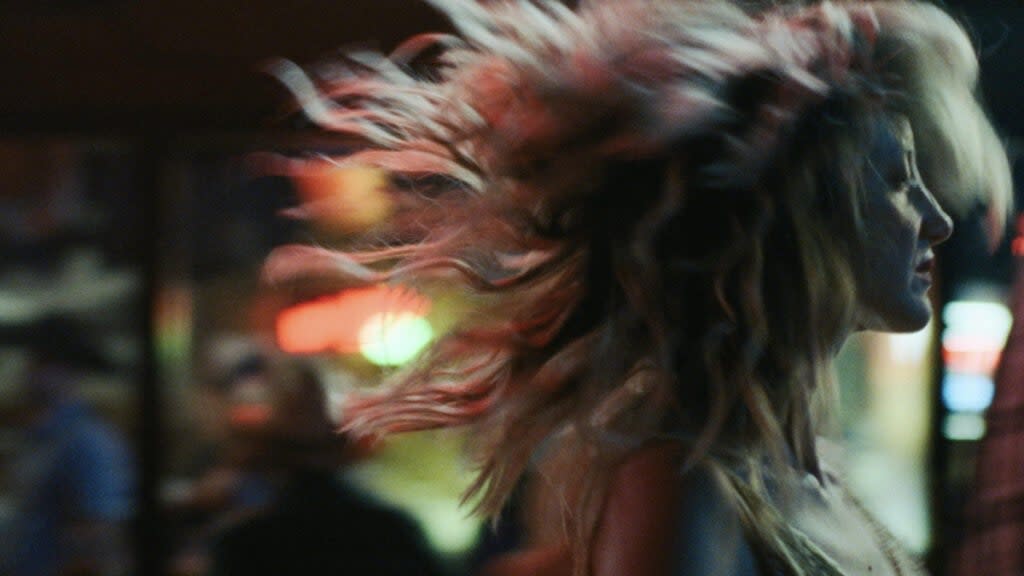‘To Leslie’ Review: Andrea Riseborough Shines in Good-Hearted, If Conventional, Redemption Story

This review originally ran on March 12, 2022, for the film’s world premiere at SXSW.
Who gets a second chance? A third? A 20th? And what is the price to pay for these opportunities? Director Michael Morris’s debut film “To Leslie” is a full-hearted, albeit conventional, ode to Leslie (Andrea Riseborough), a woman trying to break free from herself.
In the film’s opening credits, an old news clip airs: Once upon a time, Leslie won the lottery jackpot of just under $200,000 by playing her son’s birth date. She tells the anchor she wants to use the money to get on her feet, open a diner, maybe — but only after she’s bought everyone a round. More than a few thousand rounds later, we learn that these wide-eyed dreams never came to fruition.
When we meet Leslie, she’s been evicted from her motel room, forced to board a bus back to where her son James (Owen Teague, also appearing in SXSW title “The Cow”) cautiously agrees to put her up. Things go from bad to worse, however, and Leslie once again hops on a bus, this time to her hometown, in an attempt to stumble back to life.
Also Read:
‘Bros’ Decoded: Why You Shouldn’t Read Too Much Into the Gay Rom-Com’s Weak Box Office
“To Leslie” is unglamorous and unflinching, lilting from dive bars to motels across an errant desert wind. So too is Riseborough’s performance as Leslie. Riseborough, often a chameleon in television and film, takes center stage here in a raw, lived-in performance. Leslie is no two-dimensional addict — she is equal parts frustrating and magnetic. Riseborough brings a humanity and an anger to this performance; it’s not just a woman suffering, but also a woman resisting every part of herself.
Leslie’s odyssey next takes her to Nancy (an under-utilized Allison Janney) and Dutch (an even more under-utilized Stephen Root). Attempts to establish conflict outside of Leslie’s struggles feel vague and ephemeral. Her long-standing bitterness towards Nancy is underdeveloped and underwritten, with Riseborough and Janney taking smug shots at each other. It becomes clear more through telling than showing that Leslie is struggling to remain upright, but the people from her past do not want her to succeed. They resent her money, her chances. Soon after arriving, she’s back out on the street.
Writer Ryan Binaco (“3022”) dedicated “To Leslie” to his own mother, which is part of why it feels so miraculous that the film avoids too much sentimentality. Ugly things happen to Leslie, but she causes them as well. For the first hour of the film, in fact, it seems as though only ugly things will happen to Leslie. When she begins the film evicted from her humble digs, sitting out on the street in the rain, one believes she has hit rock-bottom. Alas, there are a few more bottoms to hit before the movie finally swings upward. That long first act feels, at times, punishing. Sure, Leslie has done wrong, but what is gained watching her suffer more?
Also Read:
‘Amsterdam’ Review: Disjointed, Dull David O. Russell Period Comedy Wastes Talented Cast
Eventually, Leslie crosses paths with Sweeney (Marc Maron) and Royal (Andre Royo), who run the local motel, where she’s granted the space and patience to get back onto her feet. While it can be a tired trope to present a down-on-their-luck person gaining resilience through manual labor, her figurative job cleaning the motel rooms does help Leslie metaphorically clean up her act.
It also doesn’t hurt that Sweeney — the lone figure in town who didn’t know Leslie at the time of her lotto-winning miracle — is willing to sit with her each night to make sure she doesn’t drink. Riseborough and Maron share sweet (almost chaste) chemistry. He is more concerned with helping her get back on her feet than sweeping her off of them, but still, a small romance blooms between them.
The drama that plays out in the film’s second half is much more engaging, the script gaining momentum alongside Leslie. Roadside motels, too, under the eye of cinematographer Larkin Seiple (“Everything Everywhere All at Once”), have rarely looked more romantic. (Even a microwave dinner has an air of warmth to it.) Seiple often shoots Leslie in close-up, so we bear witness to every flinch, every tear, every steely gaze.
We know — from life, from “Lost” — that winning the lottery is often more of a curse than a blessing. “To Leslie,” in turn, is an ode to everything that comes after: What can be made not from money, but from grit and determination, love and patience.
“To Leslie” opens in U.S. theaters and on-demand Oct. 7.

